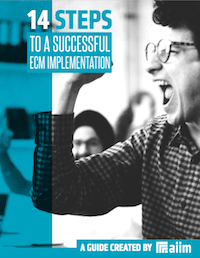The AIIM Blog
Keep your finger on the pulse of Intelligent Information Management with industry news, trends, and best practices.
Certified Information Professional (CIP)
AIIM debuted a new version of the Certified Information Professional (CIP) credential. As of November 27, 2023, AIIM is offering a new version of the exam, which reflects the skills needed for today’s information professionals.
Share
AIIM Community | Certified Information Professional (CIP)
I am brimming with pride right now. On November 27, 2023, the Association for Intelligent Information Management (AIIM) debuted a new version of the Certified Information Professional (CIP) credential. On November 27, I also found out that I had earned my CIP!
Share

Making an ECM implementation successful requires planning and attention to detail. The best way to create the right solution is to identify organizational goals and priorities. Learn how to manage a successful implementation in our free guide.
I was inspired to write this post after listening to an episode of “This Week in Windows” on Leo Laporte’s TWIT.TV podcast network. Leo and one of his co-hosts got into an interesting discussion on the use of Generative AI like ChatGTP with respect to search on the internet. Leo seemed to be making the same mistake many do, and confusing the concepts of using a search engine to answer a query by finding sources of information, and asking a Generative AI system based on a Large Language Model (LLM) to answer a question. The two things are similar but not the same, and what was being discussed was actually adding ChatGTP to Bing, bringing two technologies together to search for information.
Share
Recently, I was lucky enough to be part of a networking group that got to see a real world demo of Chat GPT in a highly practical use case. The use case was focused on internal search within an organization and utilized the strengths of Chat GPT as a Large Language Model (LLM). The organization demonstrating the use case explained they used a conversational use interface (UI) that focused on user experience and making it easier for the user to find the information they were looking for without having specific domain knowledge or expertise in "prompt engineering." The demo sparked great conversations about what various organizations are doing with pre-trained Large Language Model tools like those provided by Open AI and Microsoft.
Share
Archiving | Digital Preservation | Digital Transformation
The National Archives and Records Administration (NARA) is the nation's record keeper. We identify, protect, preserve, and make publicly available the historically valuable records of all three branches of the federal government. NARA is also the nation’s records manager. That is to say, NARA’s Office of the Chief Records Officer for the U.S. Government leads records management throughout the federal government and assesses the effectiveness of federal records management policies and programs. Part of that work is to issue guidance to federal agencies on a wide variety of records management topics. One of NARA’s newest guidance products to federal agencies is regulations with digitization standards for permanent records.
Share
In early October 2023, AIIM partnered with the AIIM Florida Chapter to host the AIIM Solutions Showcase & Strategy Summit in Tampa, Florida. This new event concept highlighted a local chapter and community while creating greater accessibility to AIIM's leadership and strategy. This terrific event was well attended and featured some great education. It emphasized the importance of knowledge sharing and relationship building in a community of practice. Here are my top takeaways from the event.
Share